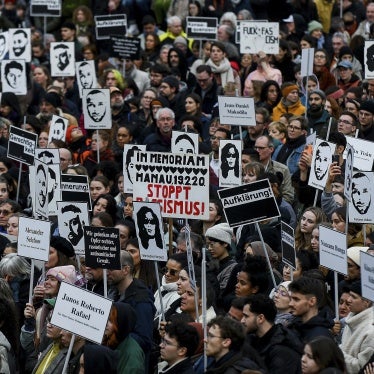David Cameron is right to say that too many governments look the other way or find reasons for inaction when people are being slaughtered and human rights violated. But does the UK's own record match up to Cameron's soaring rhetoric?
While the UK is more assertive about human rights than many other countries and more willing to exert diplomatic and other forms of pressure in defence of them, UK action is far from consistent, and there are many areas where UK practice falls short of its declared policy and of international human rights standards.
Take Bahrain. The authorities there have been responsible for large-scale repression of popular demonstrations for democracy and the rule of law. More than thirty people have died since the start of the year, four as a result of torture and medical neglect, and many of the several thousand detained have claimed that they were tortured. Yet the UK's response to these abuses has been timid and ineffectual. Ministers talk up the possibilities of the Bahraini national dialogue and the need for reconciliation. But meaningful dialogue has little chance in a climate of repression and intimidation, when those guilty of human rights abuses have not been brought to account, where opposition figures are fearful of speaking out and the media is unable to report freely.
A similar silence characterises UK policy towards Saudi Arabia -- a country with whom the UK has extensive economic, military and security links. While the UK calls for democratic reform, human rights and the rule of law in Tunisia, Egypt, Libya and Syria, and has taken some significant and high-risk action in defence of them, it seems unwilling to speak out about major and systematic human rights violations in Saudi. Saudi Arabia continues to treat women as second-class citizens, with male guardians determining whether a woman may work, study, marry, travel or undergo certain medical procedures. Shia Saudis, a religious minority of around 10 percent of the population, are also treated as second-class citizens and migrant workers remain beholden to their employers in law and practices, and are sometimes kept in conditions resembling servitude.
In Africa too, the UK appears willing to downplay human rights abuses when the countries in question are strategically important like Ethiopia, or judged "development success stories" like Rwanda. In Ethiopia, the opposition is severely repressed, war crimes committed by the Ethiopian military in the Ogaden and Somalia have gone unpunished and donor aid money has been misused by the ruling party. In Rwanda, opposition parties are attacked and intimidated, independent journalists are arrested and their newspapers closed down, and no one in the Rwandan armed forces has been brought to account for war crimes committed in neighbouring Congo. Yet both countries are large recipients of UK development aid, and aid levels are set to grow over the next five years.
And on the issue of torture, the government is pressing ahead with a detainee inquiry that lacks teeth and real independence, when recent revelations of intimate relations between British intelligence services and the Gaddafi regime confirm the need for a more thoroughgoing and robust investigation into this country's involvement in torture and rendition.
It is to Cameron's credit that he is raising human rights in his address to the UN General Assembly and calling on other governments to act more determinedly in defence of them. But to be credible, and to win over sceptics elsewhere in the world, his government will need to show more consistency in tackling torture and rights abuses carried out by our friends and allies, and make sure that its own practice is consistent with international human rights standards.
David Mepham is the UK director of Human Right's Watch









